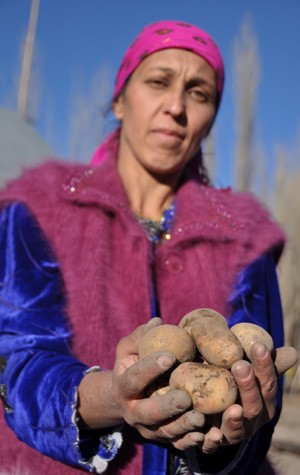
Saodat Shabonova and her husband were astounded by the harvest: each potato plant produced 44 tubers. Shabonova is an agriculture volunteer in the mountainous village of Kul, in eastern Tajikistan for a program funded by USAID and implemented by Mercy Corps. She is 36 years old and lives with her five children and husband. The family has less than one half acre of land and they grow potatoes mainly, as do most people in the area. In Tajikistan, three-quarters of the population live in rural areas.
Because of the lack of reliable seed potatoes and information about how to produce them, harvests are poor. Yields decrease because potatoes kept for planting from the previous year's harvest acquire diseases and produce less each successive year. Buying new seed potatoes is costly and risky because, unlike in more developed countries, there is no government agency to certify the quality.
This year, through the USAID program, agriculture volunteers received training on how to produce seed potatoes from true potato seeds. Along with potatoes growing below ground, a potato plant produces a small tomato-like fruit containing hundreds of tiny "true seeds." After picking, the fruits are kept in a dark, cool place for one month. Later they are put in water for three days before being minced and squeezed. The seeds that sink to the bottom are fertile true potato seeds. When planted, these tiny seeds produce normal potato plants. Unlike actual potatoes, true seeds do not pass diseases from one generation to the next, resulting in a healthy potato crop from which potatoes can be kept for planting the next year with very little yield degradation.
Shabonova was not entirely convinced of their benefit when she planted true potato seeds. But when September came, she gathered 120 kilograms of high-quality seed potatoes which will ensure much improved harvests in the coming seasons. "I am so happy my family now has good seed potatoes for several years. Besides that we learned the technology of producing them ourselves," said Shabonova.
The technology Shabonova and others in Tojikobod district learned helped them save money - they can now produce their own seed potatoes and don't have to buy them from others. In the future, perhaps they will be selling high-quality seed potatoes in the local market.







Comment
Make a general inquiry or suggest an improvement.